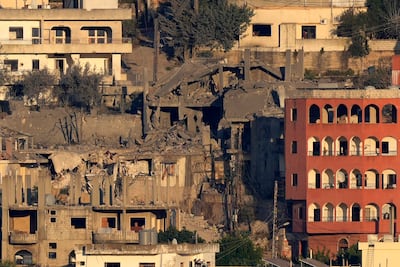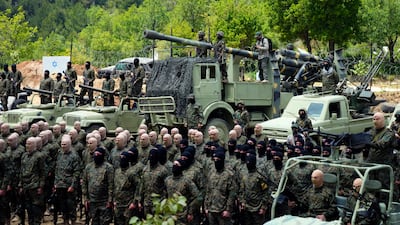Live updates: Follow the latest news on Israel-Gaza
Israeli forces and Iran-backed Hezbollah exchanged drone attacks and air strikes on Sunday, after warnings from the Lebanese militia that they were ready to attack Israeli oil infrastructure.
Hezbollah claimed a drone attack on Beit Hillel, northern Israel, while Israeli air strikes hit Kafr Kila and Taybeh, two villages in southern Lebanon.
The latest violence comes after Israeli strikes deep inside Lebanon and warnings from Israel that a wider war is imminent.
On Saturday, there was an air strike on a vehicle in Beqaa valley in northern Lebanon, with the Israelis claiming to have killed a Hamas commander in the attack.
The Jamaa Islamiya group later announced the death of one of its commanders, Ayman Ghotmeh, saying he was killed "in a treacherous Zionist raid" in Khiara in Lebanon's eastern Bekaa area.
Israel later confirmed it had carried out the strike, saying Ghotmeh was responsible for supplying the Fajr Forces, Jamaa Islamiya's armed wing, and Hamas with weapons in the area.
Hezbollah on Sunday said its fighters launched a strike "with an attack drone" on a military leadership position in the Beit Hillel barracks "in response to the assassination carried out by the Israeli enemy in the town of Khiara".
The Israeli military meanwhile said in a statement that a drone had "crossed from Lebanon and fell in the area of Beit Hillel", adding that "no injuries were reported".
Last week, Israeli Foreign Minister Israel Katz said his country was “very close to the moment of decision to change the rules against Hezbollah and Lebanon. In an all-out war, Hezbollah will be destroyed and Lebanon will be severely hit.”

Mr Katz was repeating a long-standing Israeli policy, which threatens that civilian infrastructure across Lebanon will be hit in the event of war.
Hezbollah leader Hassan Nasrallah returned the threat on Friday, warning Israel that “everything you see we can see and everything we can strike – we are not sparing in this battlefront.”
The group released a video on Saturday night titled, To Whom It May Concern, which featured satellite imagery of critical infrastructure in Israel including energy storage at the ports of Haifa and Ashdod.
Israel and Hezbollah have exchanged fire since October 8, when the Lebanese armed group opened what it calls a pressure front against Israel, in support of Hamas following the Gaza war which erupted the previous day.
But analysts said that the daily air strikes in Lebanon and rocket and drone attacks by the armed group are small compared to what a full-scale conflict would look like.
About 350 Hezbollah fighters and more than 90 Lebanese civilians have been killed in the conflict so far, while in Israel, 15 soldiers and 10 civilians have been killed.
In the last full scale war in Lebanon, in 2006, about 1,200 Lebanese were killed, including around 250 fighters. Forty-four Israeli civilians and 121 Israeli soldiers also lost their lives.
Warning of catastrophe
Amid fears of a wider war, UN Secretary-General Antonio Guterres said on Friday that, “one rash move – one miscalculation – could trigger a catastrophe that goes far beyond the border, and frankly, beyond imagination.”
“Let’s be clear: The people of the region and the people of the world cannot afford Lebanon to become another Gaza.”
The UN special coordinator for Lebanon, Jeanine Hennis-Plasschaert, and the commander of the UN peacekeeping force deployed along Lebanon’s southern border, Lt. Gen. Aroldo Lázaro, also said in a joint statement that “the danger of miscalculation leading to a sudden and wider conflict is very real.”
Israel said any escalation would be the fault of Hezbollah.
Daniel Hagari, Israel’s military spokesman, said in a televised statement this past week that since Hezbollah started its attacks on Israel on October 8, it has fired more than 5,000 rockets, anti-tank missiles and drones toward Israel.
The group is thought to have anywhere between 100,000 and 150,000 rockets and missiles, some of which can strike deep within Israel.
“Hezbollah’s increasing aggression is bringing us to the brink of what could be a wider escalation, one that could have devastating consequences for Lebanon and the entire region,” Mr Hagari said. “Israel will continue fighting against Iran’s axis of evil on all fronts.”
Hezbollah officials have said they don’t want an all-out war with Israel but if it happens they are ready.
“We have taken a decision that any expansion, no matter how limited it is, will be faced with an expansion that deters such a move and inflicts heavy Israeli losses,” Hezbollah’s deputy leader, Naim Kassem, said in a speech this past week.

